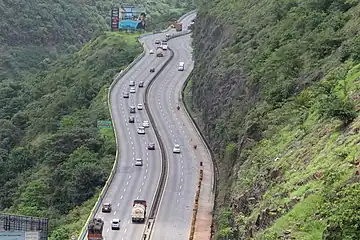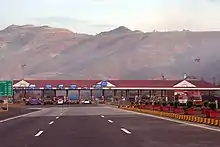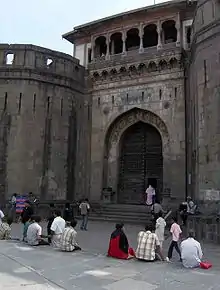| Yashwantrao Chavan Expressway | |
|---|---|
| Mumbai–Pune Expressway | |
Mumbai-Pune Expressway in red | |
 | |
| Route information | |
| Maintained by Maharashtra State Road Development Corporation (MSRDC) | |
| Length | 94.5 km (58.7 mi) |
| Existed | April 2002–present |
| Major junctions | |
| West end | Kalamboli, Navi Mumbai, Raigad District |
| East end | Ravet, Pune |
| Location | |
| Country | India |
| States | Maharashtra |
| Major cities | Kalamboli, Panvel, Khalapur Khandala, Lonavala, Talegaon Dabhade |
| Highway system | |
The Mumbai–Pune Expressway (officially Yashwantrao Chavan Expressway) is India's first 6-lane wide concrete, access-controlled tolled expressway.[1] It spans a distance of 94.5 km connecting Raigad-Navi Mumbai-Mumbai, the capital of Maharashtra state and the financial capital of India, with Pune, the cultural and educational capital of Maharashtra.[2] The expressway, which was fully operationalized in 2002, introduced new levels of speed and safety in automobile transportation to Indian roads.[3] It is one of India's busiest roads.[4]
The expressway starts at Kalamboli in Raigad District's Navi Mumbai and ends at Kiwale in Pune. It cleaves through the scenic Sahyadri mountain ranges through passes and tunnels.[5] It has five interchanges: Kon (Shedung), Chowk, Khalapur, Kusgaon and Talegaon.[6] The expressway has two carriageways, each with three concrete lanes, separated by a central divider and a tarmac or concrete shoulder on either side. Pedestrians, two-wheelers, three-wheelers, bullock carts and tractors are not permitted, although tractor-trailers (semi-trailer rigs) are permitted. Vehicles are also prohibited from halting on the expressway.[7] The expressway handles about 43,000 PCUs daily,[4] and is designed to handle up to 1,00,000 PCUs.[5]
The expressway has reduced the travel time from Kalamboli in Raigad, near Mumbai to Kiwale in Pune to about two hours. It has largely supplemented the Mumbai-Pune section of NH 48 which had become extremely congested and accident-prone.
The expressway is not part of NHAI highway network NH 48 and has been built, operated and maintained wholly by the Government of Maharashtra via Maharashtra State Road Development Corporation. NH 48 is another separate older national highway. The NH 48 merges with this expressway for a short distance near Khandala. Due to the winding route taken as the road climbs up the hills, traffic congestion occurs on that part of expressway where NH 48 merges. To alleviate this, a 'missing link' (bypass) project is under construction. This will allow traffic to bypass the hill (ghat) section, reducing the distance by about 6 km and travel time by an estimated 25 minutes.[8]
History
The government of Maharashtra appointed RITES in 1990 to carry out feasibility studies for the new expressway to be operated on toll basis. RITES submitted its report in 1994 with the estimated cost of project at ₹11.46 billion (US$140 million).
The government of Maharashtra entrusted the work of the construction of the expressway to MSRDC in March 1997 on Build-Operate-Transfer basis with permission to collect toll for 30 years. The Ministry of Environment and Forests, Government of India gave environmental clearance on 13 October 1997 and forest clearance on 11 November 1997.
The tender notice was published in leading newspapers all over India and also on the Internet. Due to the wide publicity, 133 tenders were sold and 55 tenders were received on 18 December 1997. After technical and financial evaluation, work orders were given on 1 January 1998 to four contractors. Thereafter tenders for widening of Khandala and Lonavala-Khandala bypass works were invited. The tenders were received on 24 August 1998 and orders were issued on 4 September 1998.[9]
This six-lane project was completed under the stewardship of the Maharashtra State Road Development Corporation (MSRDC). The expressway cost ₹16.3 billion (US$200 million) to construct.[9] The first sections opened in 2000, and the entire route was completed, opened to traffic and made fully operational from April 2002.[5][6] The entire length of expressway has a single layer of barbed wire fencing to keep out stray animals.
Naming
The expressway was conceived in the year 1992 Maharashtra.[10] Eventually, in 2009, the then ruling coalition (INC, NCP) named the expressway after the first Chief Minister of Maharashtra, Yashavantrao Chavan, who was a member of the Congress.[11]
Opening
The expressway was opened to public in April 2002. The expressway initially opened without a posted speed limit. However, in 2009, a speed limit of 80 km/h (50 mph) was enacted as private vehicles got more powerful and could hit higher speeds more easily. In July 2019, a panel of experts agreed to further increase the speed limit to 120 km/h (75 mph).[12] This increase was short lived, and four months later in November 2019, the Highway Police slashed down the speed limit to 100 km/h (62 mph) for cars and 80 km/h (50 mph) for trucks on flat terrain, and half of that as a speed limit for hilly terrain.
Tunnels
It has six illuminated, ventilated tunnels totaling 5,724 metres. These tunnels were built by the Konkan Railway Corporation Ltd.

| Tunnel | Description | |
|---|---|---|
| 1 | Bhatan | This tunnel opened in April 2000. The Mumbai-Pune (North) tube is 1,046 m and the Pune-Mumbai (South) tube is 1,086 m long. |
| 2 | Madap | This tunnel also opened in April 2000. The Mumbai-Pune (North) tube is 295 m and the Pune-Mumbai (South) tube is 351 m long. |
| 3 | Adoshi | This tunnel contains only a half part of the expressway which goes from Pune to Mumbai. The Mumbai-Pune carriageway skirts the eastern edge of the tunnel while the Pune-Mumbai carriageway traverses the 230-metre-long (750 ft) tunnel. |
| 4 | Khandala | This is a curved pair of tubes. The Mumbai-Pune (North) tube is 320 m and the Pune-Mumbai (South) tube is 360 m long. |
| 5 | Kamshet-1 | The Mumbai-Pune (North) tube is 935 m and the Pune-Mumbai (South) tube is 972 m long. |
| 6 | Kamshet-2 | The Mumbai-Pune (North) tube is 191 m and the Pune-Mumbai (South) tube is 168 m long. |
Distances
| Description | Distance | |
|---|---|---|
| 1 | Start of Expressway (Mumbai end) (19°01′11.47″N 73°06′13.21″E / 19.0198528°N 73.1036694°E) to Kon-Shedung interchange | 8.5 km (5.3 mi) |
| 2 | Kon-Shedung interchange to Bhatan tunnel | 6.3 km (3.9 mi) |
| 3 | Bhatan tunnel to Madap tunnel | 10.6 km (6.6 mi) |
| 4 | Madap tunnel to Khalapur toll station | 7.3 km (4.5 mi) |
| 5 | Khalapur toll station to Khalapur-Sajgaon gas station & rest area | 1.6 km (0.99 mi) |
| 6 | Khalapur-Sajgaon rest area to Adoshi tunnel. The Mumbai-Pune carriageway skirts the eastern edge of the tunnel while the Pune-Mumbai carriageway traverses the 230-metre-long (750 ft) tunnel. |
6.9 km (4.3 mi) |
| 7 | Adoshi tunnel to the Deccan-Konkan stone trestle. |
4.5 km (2.8 mi) |
| 8 | Stone trestle to Khandala tunnel | 0.8 km (0.50 mi) |
| 9 | Khandala tunnel to Khandala | 2.7 km (1.7 mi) |
| 10 | Khandala to Tungarli | 3.5 km (2.2 mi) |
| 11 | Tungarli to Kamshet-1 tunnel | 17.1 km (10.6 mi) |
| 12 | Kamshet-1 tunnel to Kamshet-2 tunnel | 1.2 km (0.75 mi) |
| 13 | Kamshet-2 tunnel to Talegaon toll station | 11.1 km (6.9 mi) |
| 14 | Talegaon toll station to Somatane interchange | 3.4 km (2.1 mi) |
| 15 | Somatane interchange to End of Expressway (Pune end) (18°39′45.85″N 73°43′35.61″E / 18.6627361°N 73.7265583°E) | 7.6 km (4.7 mi) |
| Total length of Expressway: Start to End | 93.1 km (57.8 mi) |
Toll plazas

Toll is collected at Khalapur (Pali Phata) (for the Mumbai-Pune direction) and at Talegaon (Toll Rates 2023) (for the Pune-Mumbai direction). The toll ranges from ₹540 (US$6.80) for private cars, to ₹2,200 (US$28) for multi-axle trailer trucks.[13] The toll collection data is kept as secret as per the RTI inquiry raised by activist Vivek Velankar. The expressway contract with the Ideal Road Builders (IRB) has been uploaded but the toll collection details are not there.[14][15] There is no plan to give toll waiver for this expressway.[16]
Accidents and Incidents
The expressway has witnessed a large number of road accidents, attributed to human errors and the large volume of traffic. In the first 10 years since its opening, there were 1,758 accidents with more than 400 fatalities.[17][18]
- On 28 May 2012, 27 people were reported to have died and another 26 injured in a road accident when a speeding tempo hit a stationary bus carrying passengers near Khalapur.[19][20]
- On 10 June 2010, at least 10 people were injured and 30 vehicles were damaged in a pileup near Kamshet which occurred when a MSRTC bus skidded inside a tunnel.[21]
The heavy rains in June and July 2015 caused heavy landslides at Khandala and Adoshi tunnels, which prompted the PWD to remove loose rocks to prevent further landslides.[22] To carry out such works, the expressway near to the Lonavala exit till Khopoli exit was closed from 10 am to 5 pm for 10 days after the landslide near Adoshi tunnel on 18 July 2015 which took three lives and halted the traffic for two months. The boulders fell on both carriageways which caused huge diversion of traffic towards the old highway.[23]
Sporadic instances of robbery have been reported on the highway.[24]
SaveLIFE Foundation, with support from Mahindra & Mahindra Ltd. and the MSRDC, initiated the 'Zero Fatality Corridor' project to make the expressway fatality-free by 2020.[25] Since August 2016, over a thousand engineering errors on the expressway have been fixed. As a part of this project, the 'Safety Under 80' campaign was also jointly launched by SLF, MSRDC and Mahindra & Mahindra Ltd. The initiative aimed at creating mass awareness on the dangers of speeding and the consequences of speeding were exhibited through outdoor hoardings and installation of crashes cars on both the corridors of the expressway.[26]
On 6 April 2020, during the lockdown during COVID-19, a section of the 190 year old Amrutanjan Bridge, a popular out of use railway bridge on the Bhor Ghat, was demolished by the MSRDC with the help of Maharashtra Police Highway Traffic department. The bridge was a major bottleneck on the ghat section, which caused traffic snarls and posed a safety issue for wide vehicles and trucks carrying wide goods.[27] Post demolition, the safety and flow of traffic through the ghat section has improved.[28]
On 13 June 2023, an oil tanker overturned on the Mumbai-Pune expressway and rammed against a divider on a bridge near Lonavala which went up in flames on impact, killing the driver and other three people and three were injured.[29]
In Oct 2023, Enhancing safety on the Mumbai-Pune Expressway, the Maharashtra State Road Development Corporation (MSRDC) has announced the installation of Highway Traffic Management System (HTMS) Gantries on the Yashwantrao Chavan Expressway[30]
Future expansion
MSRDC is planning to widen the expressway from current 6 lane to 8 lane.[4] The proposal has been presented in Maharashtra Cabinet for approval.
See also
References
- ↑ "Mumbai-Pune Expressway, India". Road Traffic Technology. Retrieved 21 August 2010.
- ↑ "Rs 7,000-cr project to add more lanes to expressway, NH-4". The Indian express. Express News Agency. 6 February 2015. Retrieved 21 November 2015.
- ↑ "Expressway pune mumbai pune, mumbai pune mumbai, express high way nh-4 national highway no4". Punediary.com. Retrieved 21 August 2010.
- 1 2 3 "Mumbai-Pune expressway may soon have eight lanes". The Times of India. 23 February 2013.
- 1 2 3 "Study of Rockfall at Amritanjan Bridge Site on Mumbai – Pune Expressway – A Case Study" (PDF). Journal of Rock Mechanics and Tunnelling Technology. 13 (2). July 2007. Retrieved 25 July 2019.
- 1 2 "8 lanes, longest road tunnels soon on Mumbai-Pune Expressway". The Times of India. 6 July 2011. Retrieved 26 July 2019.
- ↑ "Pune-Mumbai Expressway halting: Highway Safety Patrol fines 3,863 motorists". Times of India. 31 August 2022. Retrieved 1 October 2022.
- ↑ "Mumbai Pune Corridor (Missing Link of MPEW)". MSRDC. Retrieved 16 April 2022.
- 1 2 Dandekar, Hemalata C.; Mahajan, Sulakshana (2001). "MSRDC and Mumbai-Pune Expressway: A Sustainable Model for Privatising Construction of Physical Infrastructure?". Economic and Political Weekly. 36 (7): 549–559. ISSN 0012-9976. JSTOR 4410291.
- ↑ "Why Maharashtra must thank a watchful Bal Thackeray". Hindustan Times. 17 November 2012. Retrieved 18 July 2019.
- ↑ "Now, a controversy over Mumbai-Pune expressway". Rediff. Retrieved 18 July 2019.
- ↑ Dedgaonkar, Supriya (15 July 2019). "Now, you can drive down the Mumbai-Pune Expressway at 120 km/h, Gadkari okays panel recommendations". Pune Mirror. Retrieved 18 July 2019.
- ↑ Travelling to from Pune to Mumbai? Shell out Rs270 on E-way
- ↑ Why is Mumbai-Pune Expressway toll collection data a ‘secret’?
- ↑ MSRDC - Toll Monitoring Department
- ↑ Toll on Mumbai's five entry points to go; no waiver for Mumbai-Pune expressway
- ↑ "Asiad bus looted on expressway". The Times of India. 23 February 2004. Archived from the original on 11 August 2011. Retrieved 21 July 2010.
- ↑ Umbrajkar, Manish (13 May 2009). "MSRDC should handle security on e-way: Bokey". The Times of India. Archived from the original on 11 August 2011. Retrieved 21 July 2010.
- ↑ "26 killed in road accident on Mumbai-Pune expressway". The Times of India. Retrieved 28 May 2012.
- ↑ "27 killed in accident on Mumbai-Pune expressway". Hindustan Times. Mumbai. 28 May 2012. Archived from the original on 31 May 2012. Retrieved 28 May 2012.
- ↑ "10 injured, 30 vehicles damaged in major pile-up on expressway". Pune: Dainik Bhaskar. 10 June 2012. Retrieved 15 June 2012.
- ↑ "Another landslide near Khandala disrupts Mumbai-Pune Expressway traffic - Times of India". The Times of India. Retrieved 21 June 2017.
- ↑ "Landslide on Pune-Mumbai Expressway kills 3, halts traffic - Times of India". The Times of India. Retrieved 21 June 2017.
- ↑ "Expressway turns into a fast lane for robbers". The Times of India. 25 February 2002. Archived from the original on 19 July 2012. Retrieved 21 July 2010.
- ↑ Nandgaonkar, Satish (24 February 2016). "Maharashtra launches zero fatality initiative on Expressway". The Hindu. ISSN 0971-751X. Retrieved 22 January 2018.
- ↑ "Safety Under 80 Campaign launched by SaveLIFE Foundation in partnership with MSRDC supported by Mahindra & Mahindra Ltd | Motoroids". Motoroids. 22 December 2016. Retrieved 22 January 2018.
- ↑ "'Headache' for Pune-Mumbai commuters, 190-year-old Amrutanjan bridge demolished". 6 April 2020.
- ↑ "Pune-Mumbai expressway now 'safer' after bridge demolition". 28 June 2020.
- ↑ "Pune News: Four Die On Mumbai-Pune Expressway Near Lonavala As Oil Tanker Crashes, Goes Up In Flames; Visuals Surface". Free Press Journal. Retrieved 13 June 2023.
- ↑ Raj, Neha (16 October 2023). "Roadway Safety Upgrade: Mumbai-Pune Expressway Closure for Gantries Installation". PUNE NEWS. Retrieved 5 November 2023.



